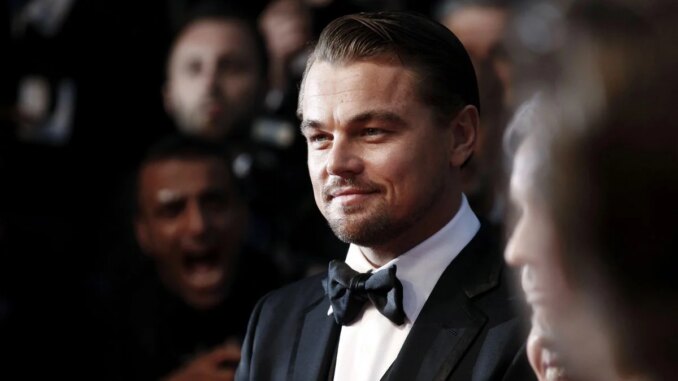
The Unseen Prelude: A Kiss of Fire Before the Ice
The name Leonardo DiCaprio conjures images of windswept romance on the bow of a doomed ship, of grand, sweeping gestures that defined a generation’s cinematic dreams. Jack Dawson, soaring with Rose on the Titanic, culminated in one of Hollywood’s most iconic on-screen kisses—a moment etched into the collective consciousness as perhaps his definitive romantic inauguration. Yet, nestled almost imperceptibly in the annals of his early career, long before the tragic allure of the North Atlantic, lay a kiss far more volatile, far more challenging, and in many ways, far more illustrative of the nascent actor he was becoming. It was a kiss not with a leading lady, but with a male co-star, an act of raw, artistic conviction that predates the Titanic by two years and offers a stark, provocative chiaroscuro to his eventual rise as a global heartthrob.
The film was 1995’s Total Eclipse, a biographical drama delving into the tempestuous, destructive, and ultimately transformative relationship between two colossal figures of French poetry: Paul Verlaine and Arthur Rimbaud. DiCaprio, then barely twenty, stepped into the shoes of the adolescent prodigy, Rimbaud—a role pulsating with defiance, genius, and a barely contained carnal energy. His co-star, David Thewlis, portrayed the older, established, and married Verlaine, drawn inexorably into Rimbaud’s orbit. Their affair was not one of gentle affection, but of intellectual sparring, artistic rivalry, and a searing, all-consuming passion that bordered on madness.
It is within this crucible of artistic and carnal fury that DiCaprio’s true "first on-screen kiss" unfurled. Unlike the carefully choreographed, aspirational romance of Jack and Rose, the kiss between Rimbaud and Verlaine was born of desperation and obsession. It was a physical manifestation of their explosive, co-dependent dynamic—a messy, intense embrace fraught with power plays, intellectual fervor, and queer longing that defied societal norms of the era, both within the film's historical setting and, to some extent, in mid-90s cinema. This wasn't a kiss designed to elicit sighs from the audience; it was meant to shock, to disquiet, to immerse viewers in the chaotic psychological landscape of two brilliant, self-destructive souls.
The scene itself, far from being a simple romantic interlude, was a visceral plunge into the depths of a relationship that was as inspiring as it was toxic. DiCaprio, with his ethereal beauty and intense gaze, captured Rimbaud’s untamed spirit, portraying a young man whose very existence was a challenge to convention. The kiss, therefore, was not merely a plot point, but a powerful symbol of Rimbaud’s all-encompassing hold over Verlaine, and vice versa—a moment of electric, volatile chemistry that underscored the film’s central themes of artistic liberation and destructive love. It showcased a young actor completely unfazed by the potential repercussions of such a bold, sexually charged, and decidedly non-mainstream role.
This early, almost forgotten embrace serves as a cinematic Rosetta Stone for understanding DiCaprio’s subsequent career choices. Long before the blockbusters and the Oscar campaigns, Total Eclipse revealed an actor hungry for challenging roles, unafraid to explore the darker, more complex facets of human experience. It was a whisper of rebellion, a hint that this pretty face possessed a fierce artistic soul. From the troubled genius in What’s Eating Gilbert Grape and the drug-addicted poet in The Basketball Diaries to the deeply flawed protagonists in Gangs of New York and The Wolf of Wall Street, DiCaprio has consistently gravitated towards characters who are morally ambiguous, psychologically intricate, and often, profoundly messy. The Rimbaud-Verlaine kiss was an early, bold declaration of this artistic ethos—a testament to his willingness to shed the mantle of a budding teen idol for the grittier, more demanding work of a serious actor.
Looking back, the Total Eclipse kiss offers a richer, more nuanced understanding of Leonardo DiCaprio’s journey. It stands as a powerful reminder that before he became the global icon synonymous with grand romance and heroic struggles, he was an audacious young talent who chose art over anticipated stardom, complexity over simplicity. It illustrates that his foundations were not built on universal appeal alone, but on a fearless exploration of character, even when it meant delving into relationships that were unconventional, challenging, and profoundly human. This almost-forgotten prelude of passion, ignited by the flame of artistic integrity, illuminates the path that would eventually lead him to the icy depths of the Atlantic and beyond, a journey of an actor always seeking the heat of authentic portrayal, no matter its form or its source.